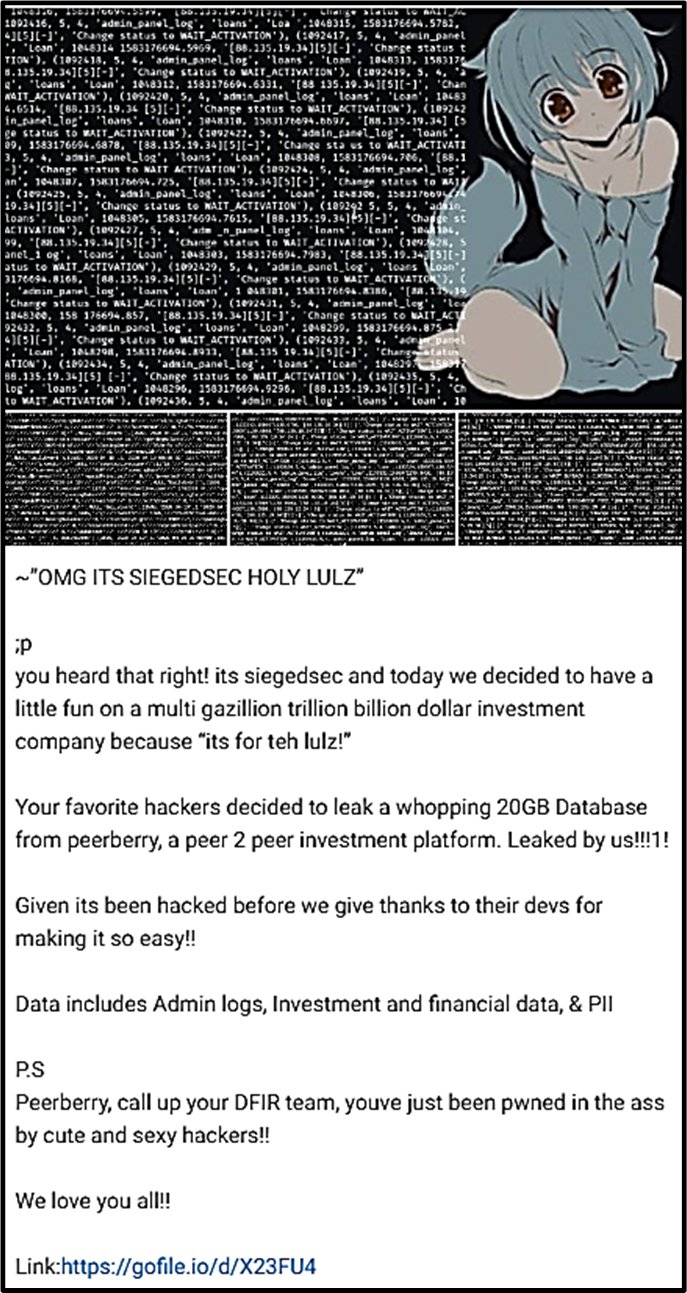SiegedSec hacker group, a recently emerged player in the dark web hacking scene, has announced the PeerBerry data breach. The group, known for its audacious tactics, is now releasing a trove of data amounting to a staggering 20GB.
This extensive cache encompasses critical information such as admin logs, personally identifiable information (PII), and sensitive investment and financial records.
The PeerBerry data breach was announced by a post on their dark web channel, humorously titled ~ “OMG ITS SIEGEDSEC HOLY LULZ.
In a cheeky tone, they declared their mischievous exploit on the multi-billion-dollar investment giant, citing “its for teh lulz!” as their motivation.
In this context, “its for teh lulz!” is an informal and playful way of saying, “it’s for the laughs” or “it’s for fun.” It suggests that the individuals behind the exploit carried it out for the sheer enjoyment or amusement they derived from it, rather than for any serious or malicious purpose.
PeerBerry data breach claimed by SiegedSec hackers

The SiegedSec hacker group taunted PeerBerry, urging them to fortify their defenses while candidly thanking the developers for what they perceived as a glaring vulnerability.
Alongside their proclamation, the threat actors provided a Gofile link, offering a glimpse into the leaked data. To learn more about this PeerBerry data breach claims, The Cyber Express reached out to the company for an official statement.
However, at the time of writing this, no response had been received, leaving the claims surrounding the PeerBerry data breach in a state of limbo. The SiegedSec hacker group is not a rookie threat actor, as it has claimed many cyber attacks since its inception.
PeerBerry is an online peer-to-peer lending platform connecting borrowers seeking financing with investors looking to lend money.
It acts as an intermediary, allowing borrowers to request loans for various purposes, which are then made available for investors to fund.
Once a loan is fully funded, borrowers receive the requested amount, and investors earn returns through repayments with interest.
Who is the SiegedSec hacker group?
Since the Russian invasion of Ukraine, a slew of new threat actors have emerged. While hacktivist motives targeting Russian entities drive some groups, others exploit the chaos for their personal gains.
The SiegedSec hacker group, a newly formed hacker collective, took center stage just days before the invasion, embracing the tagline, “sieging their victim’s security.” Since announcing its first attack, the group has rapidly escalated its operations, announcing a growing list of victims in recent months.
Evidence suggests that SiegedSec has infiltrated sensitive data and disseminated leaked emails or databases from over 30 companies since its inception in February.
Surprisingly, most of these companies have refrained from publicly acknowledging these breaches, often due to their smaller scale or non-English speaking background.
The group exhibits no discrimination in its targets, ranging across diverse industries and spanning the globe, from healthcare and information technology to insurance, legal, and finance sectors.
The true extent of damage wrought by SiegedSec remains shrouded in mystery, with many of their exploits yet to surface in public news outlets.
However, the leaked data on platforms like their Telegram channel and dark web forums poses a significant threat. This treasure trove of private corporate and personal information could potentially serve as a launchpad for other threat actors seeking unauthorized access.
The PeerBerry data breach remains a developing story, requiring verification before drawing definitive conclusions. The Cyber Express will update this post once we have more information or an official confirmation by the company.
Media Disclaimer: This report is based on internal and external research obtained through various means. The information provided is for reference purposes only, and users bear full responsibility for their reliance on it. The Cyber Express assumes no liability for the accuracy or consequences of using this information.
